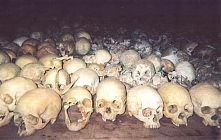Sudanese look to Rwanda for lessons in reconciliation
Nov 17, 2005 (KIGALI) — The progress Rwanda has made since its 1994 genocide makes it a model for Sudanese struggling to rebuild their country after decades of war, Sudanese visitors said Thursday.
 “Working on lasting peace, justice will be a priority” following the agreement ending Sudan’s 21-year north-south civil war, James Kok Ruea, president of the Sudan Peace and Reconciliation Commission, said as his 13-member delegation completed a week-long visit.
“Working on lasting peace, justice will be a priority” following the agreement ending Sudan’s 21-year north-south civil war, James Kok Ruea, president of the Sudan Peace and Reconciliation Commission, said as his 13-member delegation completed a week-long visit.
“This is an area where Rwanda has come up with a unique model from which we and any other countries coming out of conflict can learn,” Ruea said.
Two years ago, Rwanda established semi-raditional “Gacaca” courts whose judges are elected from their communities and can impose penalties of up to 30 years in prison. The courts have sentenced people who confessed to lesser roles in the slaughter to work on roads and other community projects as a means of fostering reconciliation.
The courts operate in addition to Rwanda’s conventional justice system and a U.N. tribunal in neighboring Tanzania trying top suspects in the genocide, in which a government of extremists from the Hutu ethnic majority orchestrated the slaughter of more than 500,000 Tutsis and moderate Hutus.
“Gacaca courts engage everyone in the search for truth. People publicly confess and ask forgiveness. That is real reconciliation,” Ruea said.
The war between Sudan’s mostly Muslim north and the Christian and animist south left about 2 million people dead. A power- and wealth-sharing deal concluded in January provides for an autonomous south with its own army, government and a new constitution during a six-year transition. After the transition, the 10 southern states will hold a referendum on independence.
Implementation of key provisions in the agreement has been delayed, raising questions about political commitment and fears about how failure might affect efforts to end an unrelated conflict in the western Sudanese region of Darfur.
“We can learn from the resilience that Sudanese have shown throughout decades of suffering,” said Fatuma Ndangiza of Rwanda’s National Unity and Reconciliation Commission, which hosted the Sudanese delegation.
“But Sudan is still a country at war,” Ndangiza said. “Without sounding arrogant, I think there is more for them to learn from us than the other way round.”
Many Rwandans see parallels between what happened here 11 years ago and what has been happening in Sudan’s Darfur. Rwanda was one of the first countries to offer and send peacekeepers to Darfur, scene of one of the world’s worst humanitarian crises.
After decades of clashes over land and water in Darfur that often pitted the region’s ethnic Arab tribes against its ethnic African tribes, conflict erupted on a wider scale in February 2003. Then, rebels took up arms against the Sudanese government, accusing it of repression and unfair distribution of wealth.
Sudan’s Arab-dominated central government is accused of responding by unleashing ethnic Arab militia known as Janjaweed who have carried out rapes and killings against Sudanese of African origin. The government denies backing the Janjaweed.
(AP/ST)
